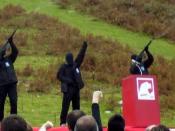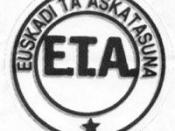Counter Terrorism implications involving an international terror organization such as the Spanish group ETA is numerous and far reaching and include crossing international boundaries and breaking into cultural regions. This paper will discuss the history of the group and the problems associated with trying to perform counterterrorism actions against a large organization that is deeply rooted in a culture yet crosses international boundaries.
First of all, for centuries, the Basque region in Europe, including portions of France and Spain, has had its own identity to include its own language and culture. The Spanish Civil War changed that and in turn created a climate for nationalists to turn into international terrorists. Will the Basque region be subject to the growth of internationalism in Europe? Or will the seeds of democracy flourish under an opening of the Spanish government to the political democratic process and remove fuel from the fire of nationalism in the hearts of those who reside in the region?
The Basque Nation and Liberty, or Euskadi Ta Askatasuna/ETA, terrorist group has been operating on the border of Spain and France since its formation in 1959 (United States Department of State, 2005, 96).
Touted as the only armed group to emerge during the Franco era the ETA chose 13 July as the formation date; possibly because it was Saint's Day of Ignatius Loyola, the most well-known Basque and founder of the Jesuit Order (Shepard, 2002, 57). The main goal of the ETA is the establishment of an independent Basque homeland in the Spanish Basque provinces, Navarra and southwestern France. ETA was designated a foreign terror group by the United States on Oct 5, 2001 (Shepard, 2002, 54) and continues to be the principal threat on Spanish soil (van de Linde et al., 2002, 100). As a group that crosses...


